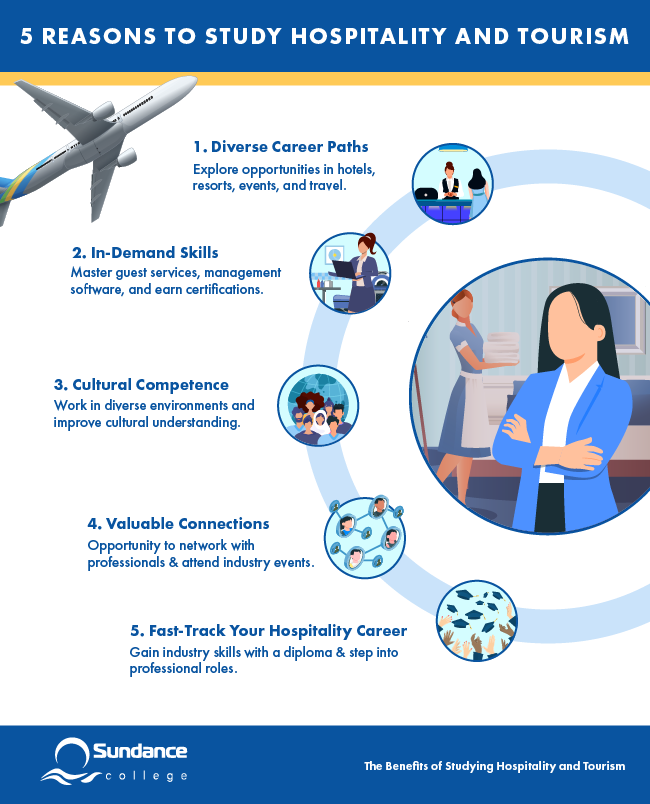Blog / The Benefits of Studying Hospitality and Tourism
The Benefits of Studying Hospitality and Tourism

Hospitality Business Management Diploma
- Hotel Management
- Resort Management
- Conference & Event Management
- Catering or Event Sales Coordinator
Table of Contents
Picture yourself greeting guests with a smile as they arrive at a quaint hotel in Alberta, organizing a picturesque lakeside wedding in Ontario, or even running a sightseeing tour in a historical European city like Athens or Rome.
These are just a few of the many possibilities that come with studying hospitality and tourism. And these opportunities don’t arrive by chance – they’re the result of focused learning and specialized training.
If you’ve ever found yourself pondering if studying hospitality and tourism is worth it. It absolutely is, and here’s why…
The formal education you undertake in this field goes beyond practical experience, providing you with the in-demand skills, cultural competence, and industry connections that can set you apart in a highly competitive market.
Let’s take a look at why studying hospitality and tourism is a valuable investment in your future, opening doors to a multitude of new experiences, diverse career paths, and success:
Listen to: The Advantages of Studying Hospitality and Tourism
Diverse Career Opportunities Through Hospitality Education

In 2023, tourism contributed over $35 billion to Canada’s economy, which means there is a significant demand for skilled professionals in the hospitality and tourism industry. Whether it’s hotels, resorts, event management, or travel planning, the industry’s success depends on professionals who deliver exceptional guest experiences. With an education in hospitality and tourism, you’ll be ready for a variety of rewarding careers, including:
Hospitality Business Management: You could be managing operations, staff, and finances to make sure guest have excellent experiences while keeping the business profitable.
Hotel & Resort Management: You could be responsible for creating a welcoming atmosphere through guest services, administration, and housekeeping management.
Conference & Event Management: You could work as an event coordinator or event manager. You’d bring events to life through strong communication, leadership, and financial planning. Whether overseeing a music festival, a wedding, or a conference, your ability to handle logistics and manage effectively means you can lead your team to success.
Catering or Event Sales Coordination: You could be working with clients to organize catering services and events, focusing on sales, planning, and customer satisfaction. You would be able to showcase your communication and organization skills while demonstrating a knowledge of food service operations.
Airlines and Cruise Lines: You could be involved with operations or providing customer service in busy environments, or you could be assisting clients with travel planning for vacations, cruises, and tours.
Hospitality Administration: You could be handling the important administrative aspects of hospitality businesses with a focus on operational efficiency and guest satisfaction. This could include managing staff, budgeting, maintaining compliance and inventory, and providing great customer service.
Develop In-Demand Skills That Employers Are Looking For
Employers in hospitality and tourism value both practical experience and industry knowledge. Studying this field equips you with essential skills for a fast-paced, customer-focused environment, including:
Hospitality and Tourism Software: Hospitality systems are only as good as those who use them. Handling restaurant management software, hotel sales applications, and accounting applications require skill and training. Your expertise with these tools can turn ordinary service into extraordinary hospitality.
Security Management: Making guests feel secure, even if they never notice it happening, is the hallmark of great security management. Employers value professionals who can protect guests, safeguard assets, and manage risks in line with OSHA regulations, creating a safe environment for all.
Sales and Marketing: In a sales or marketing role in tourism, success hinges on your ability to connect with people and promote personalized experiences. For example, a travel agent could recommend an eco-resort that offers family-friendly activities like guided nature hikes, wildlife conservation programs for kids, and sustainable farm-to-table dining. This type of tailored experience caters to families who are not only seeking adventure but are also conscious of environmental sustainability and that may encourage repeat bookings.
Supervision: Effective leadership in hospitality impacts both staff and guest experiences. Building skills in conflict management, team motivation, and onboarding transforms the workplace environment, boosting overall morale and performance.
Communication: In hospitality and tourism, how you communicate matters. Whether you’re interacting with a guest, coordinating with your team, or engaging with stakeholders, your ability to communicate clearly and respectfully, while being mindful of cultural nuances, leads to better understanding and experiences.
Each of these skills contributes to delivering positive experiences and building strong team dynamics, making you an asset in this field.
Master Cultural Competence in Hospitality and Tourism
Pursuing a career in hospitality and tourism exposes you to diverse cultures, where you experience various traditions, cuisines, and lifestyles. Interacting with people from different backgrounds improves your communication skills and cultural understanding, making it easier to serve a global clientele.
Cultural competence is essential in the hospitality industry, requiring knowledge of diverse needs, like providing vegan, kosher, or halal options for guests with specific dietary preferences. It also involves recognizing behavioral patterns. For example, Chinese travellers often prefer group activities due to their collectivist culture, while Western travellers may seek more individualized experiences. Tipping customs also vary: in the U.S., tipping is expected, while in Japan, it is often considered rude.
Staying updated with travel and hospitality industry trends, such as adventure, wellness, or luxury tourism, helps create experiences that resonate with different cultural groups. Adventure travel might attract younger travelers, while wellness tourism often appeals to Western travelers.
Embracing a global mindset can boost your career and strengthen the relationships you build, making you a vital part of the hospitality industry.
Build Valuable Industry Connections for Long-Term Success

The hospitality and tourism industry is driven by relationships, i.e., building trust and loyalty among guests, colleagues, and partners. For example, a hotel manager who chats with guests over breakfast can offer personalized recommendations that elevate their experience.
Networking plays an equally important role. Industry events like Rendez-vous Canada (RVC) and the Vancouver International Travel Expo provide professionals with opportunities to connect with industry leaders, fostering partnerships that bring fresh ideas and keep businesses competitive.
Staying informed about trends is essential too. Eco-friendly tourism is growing, with conferences like the Sustainable Tourism Symposium offering insights on practices that resonate with modern travelers.
These connections also extend online, where engaging in hospitality forums or social media groups initiate valuable discussions and mentorship opportunities.
Ultimately, these interactions, whether in person or online, drive personal growth and contribute to a vibrant, welcoming hospitality and tourism industry.
Fast-Track Your Hospitality Career

Starting a career in hospitality and tourism doesn’t have to be a slow process. With the right education and practical experience, you can quickly transition from student to professional, gaining the skills needed to find your footing in this industry.
A comprehensive diploma program like Sundance College’s Hospitality Business Management focuses on major areas of the field, including front office management, food and beverage operations, hospitality sales and marketing, and human resources management.
You’ll also gain firsthand experience with hospitality-specific computer systems and housekeeping management, as well as the opportunity to earn globally recognized certifications through the American Hotel & Lodging Educational Institute (AHLEI).
The program includes a 5-week practicum in a hospitality setting, allowing you to apply your knowledge in a professional environment. By the time you graduate, you’ll be prepared for roles in hotel management, restaurant management, tourism, and event planning, making this diploma an important step toward a career in hospitality.
The benefits of studying hospitality and tourism go beyond just technical skills. You learn to create experiences that resonate with people long after they’ve gone. Whether its welcoming guests in a hotel lobby or organizing an event, you learn the art of making others feel valued. The experience you gain leads to a wide range of opportunities, from managing resorts to planning events and working with diverse teams.
If you see yourself building a career where every detail matters and every guest counts, this could be your calling.
Related Blogs
Subscribe for more career advice
Blog Categories
Share on:
